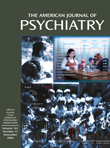A Pilot Study of d-Cycloserine in Subjects With Autistic Disorder
Abstract
OBJECTIVE: The authors assessed the effects of d-cycloserine on the core symptom of social impairment in subjects with autism. METHOD: Following a 2-week, single-blind placebo lead-in phase, drug-free subjects with autistic disorder were administered three different doses of d-cycloserine during each of three 2-week periods. Measures used for subject ratings included the Clinical Global Impression (CGI) scale and Aberrant Behavior Checklist. RESULTS: Significant improvement was found on the CGI and social withdrawal subscale of the Aberrant Behavior Checklist. d-Cycloserine was well tolerated at most of the doses used in this study. CONCLUSIONS: In this pilot study, d-cycloserine treatment resulted in significant improvement in social withdrawal. Further controlled studies of d-cycloserine in autism appear warranted.



